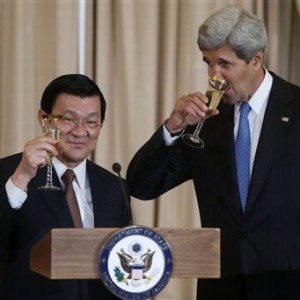Vietnam leader defends record to US, seeks trade

Secretary of State John Kerry and Vietnam’s President Truong Tan Sang toast during a luncheon at the State Department in Washington, Wednesday, July 24, 2013. (AP Photo/Charles Dharapak)
WASHINGTON—Vietnam’s president called Wednesday for progress on a Pacific trade pact and defended his government’s human rights record as he faced heated criticism from lawmakers on a rare visit to Washington.
Truong Tan Sang is only the second Vietnamese president invited to the White House since the normalization of ties between the former war foes, which have increasingly found common cause amid unease over China’s rise.
At a luncheon hosted by Secretary of State John Kerry, Sang voiced hope the 12 nations in talks on the Trans-Pacific Partnership would strike an agreement “soon” on the potentially landmark free trade pact.
Commerce Secretary Penny Pritzker, in a separate meeting with Sang, called the pact “a top priority” for President Barack Obama and hoped the negotiations would conclude this year.
Obama has voiced hope the agreement — which, with the recent inclusion of Japan, would cover 40 percent of the global economy — would help shape Asia’s future by setting international rules.
But members of Congress have warned they may object to the Trans-Pacific Partnership unless Vietnam improves its human rights record. US officials say Vietnam is holding more than 120 political prisoners.
Sang aimed to counter that view, saying he brought on this visit religious leaders who held “straight-forward, open discussions” to give the United States “a better understanding about the real situation in Vietnam.”
“Vietnam has been making sustained efforts to protect and promote human rights so that the people can benefit from the finest results of the reform process,” Sang said.
He likened his efforts to those of Obama, saying Vietnam was making improvements in areas such as health care.
The US State Department and advocacy groups have given a different picture of Vietnam, saying that Vietnam has stepped up repression of political dissent and targeted religious leaders who are not government approved.
Representative Chris Smith, a Republican from New Jersey, said Obama should tell Sang that any economic benefits will be linked to “tangible” progress on human rights.
Smith, who heads a House subcommittee on human rights, accused Obama of simply putting an “X in the box” by raising concerns without warning of consequences for inaction.
“This is not the time for photo ops or treating human rights abuse as a talking point,” he told a news conference.
Representative Ed Royce, chairman of the House Foreign Affairs Committee, held up a picture of a Vietnamese religious leader allegedly beaten by authorities and said: “We want human rights on the agenda. We want this stopped.”
Labor rights activists called for Obama to threaten to oust Vietnam from the Trans-Pacific Partnership, issuing a report saying that Hanoi repressed unions, imposed “grueling” hours at factories and practiced forced labor.
“Vietnam should not be rewarded for its bad behavior,” said James Hoffa, president of the International Brotherhood of Teamsters, saying human rights “should be a requirement, not an afterthought” in free trade agreements.
But three lawmakers from Obama’s Democratic Party said that the president promised them during a meeting that he would raise human rights with Sang on Thursday.
“I feel that anyone who supports ending human rights violations in Vietnam has an important ally in the White House,” said Representative Alan Lowenthal, who, like Royce, represents a California district with a significant Vietnamese-American community.
In a joint letter to Obama, family members of three dozen detained Vietnamese activists or bloggers urged the US leader to “stand up for the people of Vietnam” by pressing Sang to free all political prisoners.
Obama has put a priority on building relations with Southeast Asia, seeing the growing and largely US-friendly region as neglected in the past. Sang is the fourth Southeast Asian leader at the White House this year.
The Obama administration has been firm in calls since 2010 to preserve freedom of navigation in the West Philippine Sea (South China Sea), a strategic waterway where Vietnam and the Philippines have growing friction with Beijing.
Kerry, a Vietnam veteran who as a senator played a role in the normalization of relations in 1995, hailed Vietnam as “one of Asia’s great success stories” and pointed to the steep growth in per capita incomes and trade.
“The Vietnamese have learned from their own history that we all have no permanent enemies, only friends yet to be made,” Kerry said.
“Today, when Americans hear the word Vietnam, they are able to think of a country, not a war. And that is our shared accomplishment,” he said.
For comprehensive coverage, in-depth analysis, visit our special page for West Philippine Sea updates. Stay informed with articles, videos, and expert opinions.